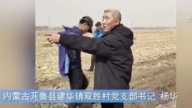【新唐人2013年12月28日訊】最近澳大利亞國庫部,宣佈了批准「中國國家電網公司(SGCC)」,收購澳大利亞兩家能源公司的部分股份。《新華社》的報導沒像以往一樣,大肆渲染收購海外資產能證明中共的強大,而是用了「有條件批准」的字眼。專家認為,SGCC已不是一個單純的經濟實體,同時也是中共迫害人權的工具。外界認為,最近隨著中共政局裡的周永康、李東生等老虎落馬,以曾慶紅為後臺的「國家電網公司」可能也感到不妙,而匆忙以購買國外公司的形式轉移國有資產。
12月20號,中共《新華社》以「澳政府有條件批准中國國家電網收購申請」為題,報導了澳大利亞國庫部宣佈,批准中國「國家電網公司」收購澳大利亞兩家能源公司的股份一事。
報導強調,批准收購申請的條件是,「國家電網」為這兩家澳大利亞能源公司指派的董事會成員,必須超過半數是澳籍常住公民。報導還引述了澳大利亞國庫部長喬•霍基的聲明:澳大利亞開懷擁抱商業機會,歡迎外國投資,只要它們不違背澳大利亞國家利益。
報導最後點出,「國家電網」並沒有透露收購價格,但從澳大利亞當地媒體的報導,才知道收購價格高達60億美元。
美國南卡羅萊納大學艾肯商學院教授 謝田:「這也是他最方便的,可以堂而皇之的轉移資產的辦法,中國老百姓只能看著中國的財富被一點點的掏盡,一點點的流向海外,這樣實際上對自由社會,自由貿易,自由企業制度都是一個極大衝擊。」
12月26號,《新華社》報導了「國家電網」一些負面消息,報導說,來自國家電網的權威消息源證實,已有多條特高壓輸電線路,因國家規劃意見分歧、評估、審批遷延而擱置。
中共「國家電網公司」成立於2000年,董事長、黨組書記劉振亞,兼任過山東「魯能集團」董事局主席。據大陸《財經》雜誌2007年1月報導,山東超大型國有企業「魯能集團」,曾經借轉制之名,悄悄將超過700億的國有資產,送給曾慶紅、俞正聲、王樂泉等中央高層家屬。事件敗露後,劉振亞在曾慶紅的庇護下,逃過一劫。
前中共國家副主席曾慶紅1989年隨前領導人江澤民進京,素有江澤民的大管家之稱。在中共迫害法輪功的元兇——「610」 頭目李東生被調查,外界盛傳中共前政法委書記周永康落馬的同時,《百度》驚現「立即逮捕法辦羅幹、曾慶紅、江澤民」,以及「江澤民、羅幹、周永康、李東生」等,因「反人類罪」、「群體滅絕罪」而遭到起訴等字樣。
北京時政觀察人士華頗:「國內矛盾已經達到了激化臨界點,有意解除民怨,那就得分蛋糕,就得打土豪分田地,所以就不得不觸碰中國既得利益集團和這些權貴的利益,不得不觸動曾慶紅等代表的這些利益集團的利益。」
劉振亞,他是國有大企業中迫害法輪功的急先鋒。劉振亞不但自己親自污衊法輪功,還在中電網27家網省公司中,直接參與了迫害法輪功修煉者僱員。被證實的受迫害僱員人數達139名,其中16人被迫害致死,致瘋和失蹤。
劉振亞迫害法輪功學員形式包括:限制人身自由,非法綁架、關押、監控和跟蹤﹔同時還對法輪功學員,採取解僱、扣發工資、罰款等方式進行經濟迫害﹔另外還利用強行關「洗腦班」的形式進行精神迫害。
旅澳中國社會問題專家:「中國的國企一半是經商,一半是政體,也就是它是帶有政治性很強的這麼一個經濟實體,真正當家作主的是黨委書記,一切以黨的意志為他經營的指導方針。」
而在國內,「國家電網公司」壟斷的電費越來越高。遼寧省丹東和湖北宜昌居民投訴,供電公司通過改換智能電錶的形式,將電費變成兩倍。
採訪編輯/劉惠 後製/黎安安
China State Grid Acquisition of Australian Energy Company Stakes: Relocation of National Assets?
The Australian Treasury Department recently announced
the approval of the China State Grid Corporation’s (SGCC)
acquisition of stakes in Australian power companies.
Xinhua News Agency reported the news, but was
without the expected exaggeration in propaganda
about the power of China acquiring foreign assets.
The report stated that the approval was “conditional.”
Experts suggest that SGCC is not purely an economic entity.
It is also an instrument with which the Chinese
Communist Party conducts human rights abuses.
With the recent downfalls of Zhou Yongkang and
Li Dongsheng, there must be unease within SGCC about
it’s notorious behind the scene boss, Zeng Qinghong.
The purchasing of foreign companies is
believed to be transfering state-owned assets.
On December 20, Xinhua News Agency reported
that the Australian government has conditionally
approved the China State Grid Corporations
(SGCC) acquisition of Australian energy companies.
This is according to an Australia
Treasury department statement.
The acquisition was approved on the following condition:
At least half of the members appointed by the State Grid
to the boards of SP AusNet and Jemena must be Australian
citizens who are ordinarily residents of the country.
According to a statement from Treasurer
Joe Hockey, “Australia is open for business.
…we welcome foreign investment when
it is not contrary to the national interest.”
Xinhua also stated that the SGCC
did not disclose the requisition costs.
Australian local media reported the cost at $ 6 Billion.
Prof. Xie Tian, Business School, University
of South Carolina Aiken: “This is its most
convenient way to transfer assets publicly.
People can only watch as China’s
wealth continues to outflow.
It has a large impact on a free society,
free trade, and the enterprise system.”
On December 26, Xinhua reported
negative news about SGCC.
According to authoritative sources from the State Grid,
it was confirmed that there are a number of plans
for UHV transmission lines that have been shelved.
This is due to disagreement in national
planning, assessment, and approval.
SGCC was founded in 2000, with Party
Secretary Liu Zhenya as the Chairman.
Liu Zhenya was former Chairman of
Shandong Luneng Group Board of Directors.
In a January 2007 report by Caijing magazine, Luneng
Group is a large state-owned enterprise in Shandong.
In the name of restructuring, over 70 billion yuan of state
assets were transferred quietly to the family of high officials.
These officials included Zeng Qinghong,
Yu Zhengsheng, and Wang Lequan.
After the incident was brought to light, Liu Zhenya
escaped punishment under Zeng Qinghong’s shelter.
Zeng Qinghong followed former regime
leader Jiang Zemin to Beijing in 1989.
As a former Vice-President, Zeng
became known as Jiang Zemin’s servant.
Recently, high-level 610 Office official Li Dongsheng,
one of the main protagonists in the persecution
of Falun Gong, was placed under invesigation.
Former Secretary of the Politics and Law Committee,
Zhou Yongkang, is also rumoured to be under investigation.
Chinese search engine Baidu reportedly
lifted the ban on search terms including,
“arrest Luo Gan, Zeng Qinghong, Jiang Zemin.”
It also included, “Jiang Zemin, Luo Gan, Zhou Yongkang,
Li Dongsheng, crimes against humanity, genocide.”
Hua Po, Beijing political commentator: “The
conflicts have intensified to a critical point.
In order to reduce grievances, they have to share the pie.
This will impact those with power, and vested interests,
such as those represented by Zeng Qinghong."
Liu Zhenya is known as a vanguard in the persecution
of Falun Gong, from the CCP’s state-owned enterprises.
Liu Zhenya has personally slandered Falun Gong.
He is also reported to have been directly involved in the
persecution of employees who practiced Falun Gong.
in 27 provincial subsidiary companies of the State Grid.
He has been confirmed to have persecuted 139
employees, and led to 16 of them losing their lives,
suffering psychological trauma, or have disappeared.
Liu Zhenya conducted several forms of persecution;
restriction of personal freedoms through illegal
kidnapping, detention, monitoring and stalking;
economic persecution through dismissal,
withholding of wages, and illegal fines;
and psychological torture, through
sending them to brainwashing centers.
Chinese commentator: “China’s state-owned
enterprises are half business and half politics.
SGCC is an economic entity with strong political attachments.
The leader is the general secretary of the CCP,
and the party’s will is its guiding principle.”
As an addendum, monopolization of energy has also
allowed SGCC to increase its utility bills higher and higher.
According to complaints from residents in Dandong,
Liaoning Province and Yichang, Hubei Province,
the company has doubled utility bills.
This rise was undertaken in the name of upgrading meters.
Interview & Edit/LiuHui Post-Production/Li Anan




























